Phillip Schofield, a prominent figure in British television, has had a remarkable career filled with successes and personal revelations. However, these revelations emerged alongside a sudden halt in his flourishing professional journey.
After weeks of media speculation about a supposed conflict with his onscreen partner, Holly Willoughby, Schofield decided to step down. Initially appearing as a disagreement between friends, it soon became apparent that a hidden truth awaited.
Both screen and print media pursued the story relentlessly. In contrast, social media overflowed with true, false, and ambiguous narratives. Philip Schofield eventually decided to come clean and admit to an affair with a younger man, confessing to having told lies to everyone involved, including Holly Willoughby, ITV bosses, and the rumours.
In a candid interview with BBC’s Amol Rajan, he opens up about his experiences, offering a rare glimpse into the life of a man who has spent decades in the public eye. However, he is now a shadow of his former self. What worried me while I watched the interview was how close Philip Schofield was to the edge. A man being driven to bring his life to an end.
Although his conduct lacks dignity, no laws have been broken. He will grapple with moral issues that will haunt him in the future. But who are we to judge his personal life? We indeed find instances of light lies if we examine our own lives.
While there is often some truth behind rumours, those in the spotlight often lose societal perspective. Thus, it would not surprise me if Schofield identifies with Stormzy’s song ‘Big For Your Boots.’ Yet, my father taught me to be sceptical of what I hear and to only believe half of what I see.
The interview was deeply unsettling, stirring up emotions that resonated with my experiences. Schofield’s heartfelt words, both spoken and unspoken, conveyed the depths of his anguish and struggles. At that moment, the surrounding narratives faded away. I was wholly absorbed in the profound depression and imminent despair he expressed. It was a painful reminder of my own journey over the past two years, where I grappled with my own external-inflicted pain. When the world seems to collapse around you, extinguishing the lights becomes an unsettling refuge.
Words carry so much meaning if we only stop to take them in. I wanted to analyse the interview by going beyond the surface. As I delved into the intricacies of Schofield’s narrative. I dissected his words, identifying key themes that shed light on his personal relationships, professional challenges, and emotional journey, from Schofield’s workplace dynamics to the nuances of his personal relationships.
This isn’t just an exploration of the story everyone is telling; it’s a deep dive into Philip Schofield. I decoded the language, revealing the themes that echo throughout his discourse. As you read, you’ll gain a new perspective on Schofield, seeing him as a television personality and a man navigating life’s complexities.
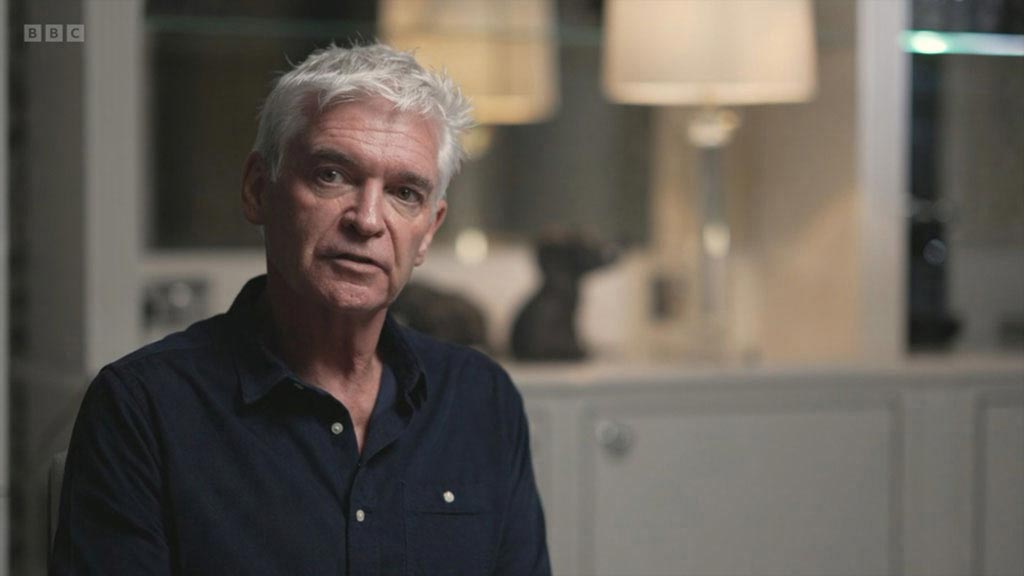
The fall of a TV star. How Phillip Schofield lied about his affair and his stay on ITV ended.
How did we get here? Phillip Schofield was a TV legend. He has hosted many shows on ITV for over 20 years. Schofield is (well, was) loved by millions of viewers. He also had a happy marriage with his wife, Stephanie. He then came out as gay last year, giving himself a pat on the back, saying he was proud of himself.
But lingering in the background was a dark secret. Schofield had been having an affair with a much younger man. A man Schofield met when he was a teenager. He helped him get into TV, and they worked together on This Morning. Schofield has now said it was “unwise, but not illegal”. However, has also admitted that he hid it from everyone.
He got caught, confessed to his affair. He said he was “very sorry”. Schofield said he lied to everyone. He said he quit ITV and his agents. Left the British Soap Awards (was due to present this on the 6 June 2023); it was due to be his last public appearance.
ITV was shocked. They said they were “deeply disappointed” and felt “badly let down”. ITV said he would not be on ITV again. They said they trusted him, but he broke their trust.
Holly Willoughby, his co-host on This Morning, said she was hurt. They had been friends for over 10 years. She asked him if he had an affair. He said no, but he lied to her too. She said she still loved him as a friend. But she felt betrayed by him.
Alison Hammond and Dermot O’Leary took over This Morning. They became temporary acting new hosts, paid tribute to Schofield, Saying he was “one of the best live television broadcasters this country has ever had”. They wished him well for the future.
The backlash from the newspapers, who have slammed Phillip Schofield for his selfishness and hypocrisy
Newspapers have been harsh on Schofield. They reported on his lies, affair, impact on others, and downfall, dug up dirt on him. They exposed his secrets. It appears that they had been accumulating ammunition over the years to attack.
Newspapers doubted his sincerity. They wondered why he came out as gay last year and suggested that it was a PR stunt to cover up his affair. They said he used his sexuality to gain sympathy and attention.
Newspapers revealed the troubles at ITV. They spoke to former This Morning stars who complained about Schofield’s behaviour, he was “controlling” and “difficult” to work with, there was a “toxic culture” at ITV. They said there was no trust or respect among its employees.
Newspapers cut ties with Schofield. They dropped him as a brand ambassador and a columnist, he damaged their reputation and credibility. They said they could not work with him anymore.
Newspapers criticised him for being “selfish” and “hypocritical”. They said he hurt his wife, family, friends and colleagues, he betrayed their loyalty and trust. They said he only cared about himself.
Only a few newspapers showed some sympathy or support for Schofield. They acknowledged his achievements and his struggles with his sexuality. They said he deserved some compassion and forgiveness.
Beyond the scandal, a compassionate perspective should always prevail in a crisis
I can’t form an opinion regarding the subject matter as I wasn’t present. However, I’ve experienced the sting of deception from a malicious individual, so I empathise with those close to Phillip Schofield who feel betrayed.
Watching Schofield’s BBC interview, I was concerned for his well-being. His words and demeanour suggested a man teetering on the brink. I recognised this because I’ve felt similar emotions in recent years. Some may question whether he was merely putting on a convincing performance. To those doubters, I’d suggest watching him on ‘This Morning’. His empathetic responses in various situations are consistent, making me believe his interview reactions were genuine.
Organisations often prioritise their reputation in crisis, initiating investigations and severing ties. However, is this approach always fair or compassionate to the individuals involved? Is it constructive for the organisation and its stakeholders?
Consider Phillip Schofield’s case. A beloved ITV presenter, he came out as gay last year but also admitted to an affair with a younger male colleague. He expressed being “very sorry” for his actions, leading to his immediate departure from ITV.
ITV felt “deeply disappointed” and “badly let down”. His co-host, Holly Willoughby, was “very hurt”. High-profile brands, including The Prince’s Trust, severed ties with him, and he faced backlash from fans and critics, some labelling him “selfish” and “hypocritical”.
A top lawyer was engaged to review the events surrounding Schofield’s affair and departure. MPs called for an inquiry into ITV’s handling of the scandal and their duty of care towards staff.
Schofield’s actions were wrong, causing hurt and betrayal. However, I believe there’s a mental health aspect to consider. He struggled with his sexuality and faced immense pressure and stress. I wonder if more understanding and support could have been offered to him. I question whether the response was more about image than empathy.
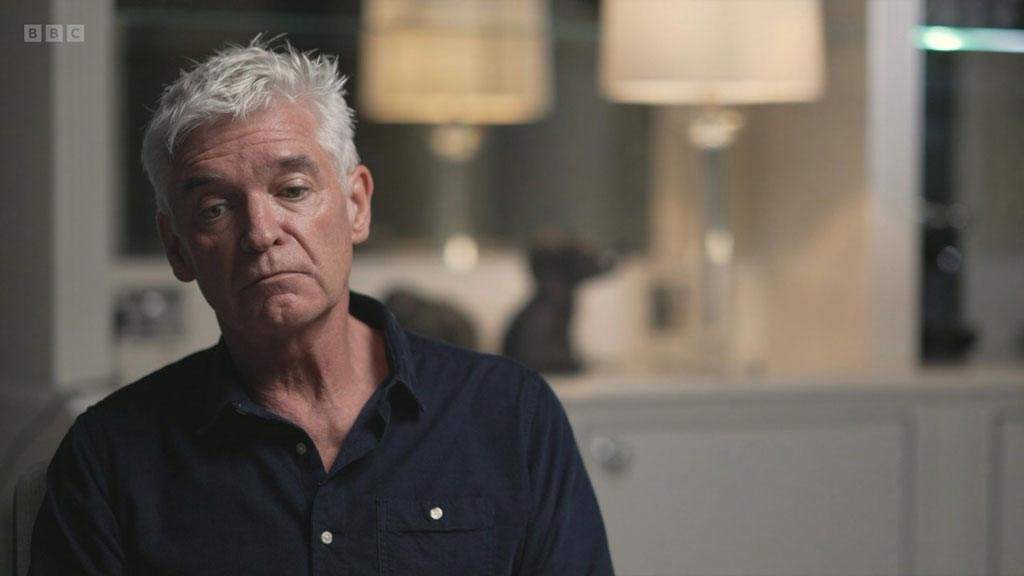
The human cost of public scrutiny
The spotlight on mental health has recently intensified, reflecting a growing societal awareness of its importance. High-profile cases and public discussions have underscored the need for a more compassionate, understanding approach towards mental health issues.
This shift in focus is particularly pertinent in the face of public scrutiny, where the human cost can be significant. Phillip Schofield’s case is a poignant example of this. Drawing from the interview conducted by Amol Rajan of the BBC, which revealed a man on the brink. With Schofield’s hands shaking throughout the conversation.
Anyone who viewed the interview would concur that it was a disconcerting spectacle. From the outset, the anguish etched on Schofield’s face and mirrored in his eyes was palpable.
His struggle to hold back tears and the tremor in his voice, teetering on the brink of breaking at any moment, were profoundly affecting. His words painted a picture of a man who felt he had lost everything, his career seemingly over, and his future appearing bleak.
It seems that I’m not alone in my perspective that organisations often prioritise preserving their image over the well-being of individuals. Caroline Flack’s mother, Christine, criticised ITV’s situation handling. Suggesting that the broadcaster had not learned from her daughter’s tragic death.
She highlighted the need for better support systems for presenters, who are often treated as commodities rather than people. She empathised with Schofield’s situation, recognising his immense pressure and the potential for profound mental health implications.
Schofield’s own admission that his career was over following the affair further emphasised the toll this situation has taken on him. He spoke of his remorse and regret and the darkness he saw ahead. His words echoed Christine Flack’s, highlighting the need for compassion and understanding in such situations.
Selective morality and celebrity downfall
In the public sphere of influence, we often see a pattern of turning a blind eye to the questionable actions of high-profile individuals, only to vilify them when they fall from grace. This selective morality is evident in the cases of Rolf Harris, Jimmy Savile, Harvey Weinstein, Bill Cosby, and R Kelly. It’s as if their fame and power exempt them from the moral standards the rest of us hold.
In the case of Phillip Schofield, the recent allegations of a toxic working environment at ITV and his affair with a younger male colleague have led to a public outcry. Yet, these issues were seemingly overlooked when he was at the height of his career. Now that he’s facing a crisis, the same people who once turned a blind eye are now quick to criticise and condemn him.
This behaviour is not limited to this situation; it’s prevalent in public life. It’s akin to a Christian or a Muslim pulling out the Bible or the Quran to prove a point yet turning a blind eye to a suffering brother or sister. It’s a classic case of hypocrisy.
The question we need to ask ourselves is, why do we allow our values to be compromised when it comes to stars too big to fall? Why do we ignore the issues until they become too big to ignore?
Amid this turmoil of accusations and recriminations, we must remember that we don’t know the truth. The media presents truths, half-truths, and potentially even untruths. Yet, we quickly pass judgement, take sides, and condemn.
If we are willing to hold people accountable when they are down, we should be equally helpful when they are on top. No one is above reproach and should be exempt from the moral standards we all should uphold.
When we choose to throw a low blow or an illegal kick at someone who’s already down, it only diminishes our own integrity. It’s easy to shout from the sidelines. Still, it’s much harder to maintain a stance of fairness and compassion, especially when the crowd is howling for blood.
Analysis of the BBC interview with Philip Schofield
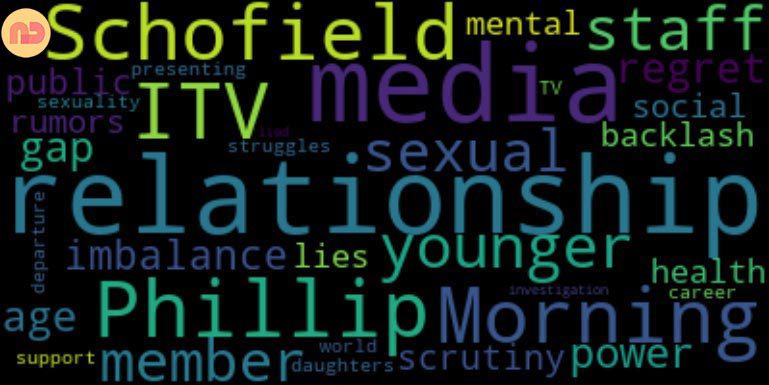
Word cloud analysis of the interview to help with the visualisation of keywords
I often use a word cloud to provide a quick visual summary of the keywords and themes discussed while conducting qualitative analysis. The word cloud above represents the words used in the interview. The size of each word indicates its frequency or importance in the discussion between Amol Rajan and Philip Schofield.
From content analysis, we can see that words like “relationship”, “media”, “mental health”, “support”, “career”, and “investigation” are among the most frequently used. The implication of these words could mean:
“Relationship” is one of the most famous words. Reflecting the significant focus on Schofield’s relationship with a younger staff member. This relationship, its implications, and Schofield’s feelings of regret are central to the interview.
“Media” and “scrutiny” are also quite large. Indicating the substantial discussion around the intense media scrutiny and public backlash Schofield has faced since the relationship came to light. This includes the spread of rumours and lies on social media, which have negatively impacted his mental health.
“Mental health” stands out. Reflecting Schofield’s openness about his mental health struggles. He discusses his struggles with his sexuality and the scandal’s impact on his mental well-being.
“Support” is prominent. Highlight the importance of Schofield’s support from his daughters and others in the TV presenting world. This support has been crucial for him during this challenging time.
“Career” and “departure” are significant. Reflecting on the discussion around the scandal’s impact on Schofield’s career. He talks about his departure from This Morning and his belief that his career in TV is over.
“Investigation” and “lied” are also noticeable. Referring to ITV’s investigation into the allegations of an improper relationship. Schofield admits that both he and the younger staff member lied during the investigation, denying the existence of the relationship.
The key themes from Philip Schofield’s interview with Amol Rajan
In qualitative research, thematic analysis is a widely used method for identifying, analysing, and reporting patterns (themes) within data. It organises and describes the data set in rich detail and interprets various aspects of the research topic. The process involves familiarisation with the data. Generating initial codes, searching for themes, reviewing, defining, naming, and producing the final outcome.
In the context of this interview with Philip Schofield, a thematic analysis was conducted to gain a deeper understanding of the conversation. The interview was read in total, and initial codes were generated based on recurring topics and ideas. These codes were then grouped into broader themes that accurately represent the critical points of the interview.
The thematic analysis provided a structured, detailed, and complex data summary. It went beyond counting phrases or words and explored the underlying ideas and assumptions theorised as shaping or informing the semantic content of the data.
After the heavy work, the main themes that emerged from the interview were…
Workplace Relationship: A significant part of the interview revolves around Schofield’s relationship with a younger staff member at This Morning. He admits to having a sexual relationship with the individual, who was 20 when it began. Schofield regrets this relationship, acknowledging the age gap and the potential power imbalance due to his position.
Media and Public Scrutiny: Schofield discusses the intense media scrutiny and public backlash he has faced since the relationship came to light. He mentions the spread of rumours and lies on social media, which have negatively impacted his mental health.
Personal Struggles: Schofield talks about his struggles with his sexuality, which he grappled with during his relationship with the younger staff member. He also discusses his mental health struggles, stating that he doesn’t see a future for himself and feels he has lost everything.
Support System: Schofield mentions the support he has received from his daughters, who have stood by him throughout this ordeal. He also says the surprised support he received from some individuals in the TV presenting world.
Career Impact: Schofield discusses the impact of the scandal on his career. He talks about his departure from This Morning and his belief that his career in TV is over.
ITV’s Investigation: The interview touches on ITV’s investigation into the allegations of an improper relationship. Schofield admits that both he and the younger staff member lied during the investigation, denying the existence of the relationship.
In further relationship analysis, these themes are expanded from the central theme into primary, secondary and tertiary themes in the relation map below.
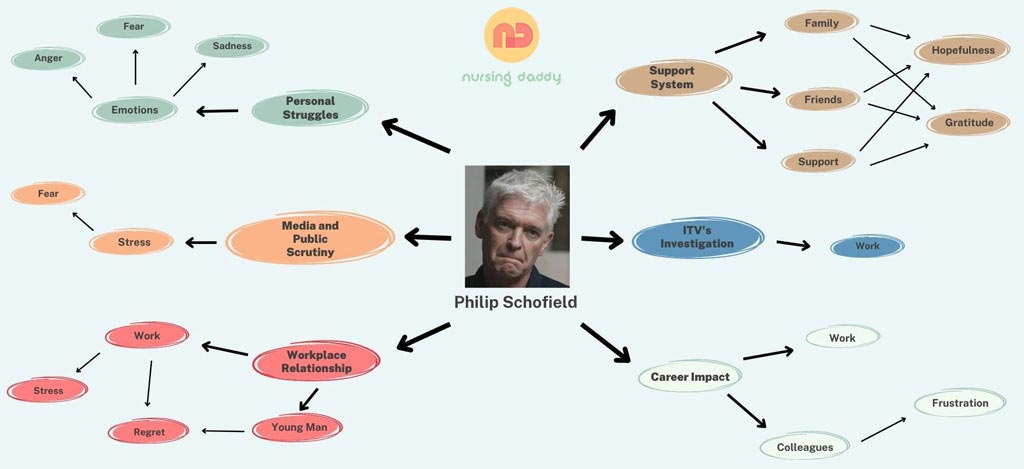
Visualising Connections in Philip Schofield’s Interview: A Relationship Map
A relationship map (above) is a visual tool used in qualitative research to illustrate the connections between different themes or concepts. It provides a clear and concise way to understand the relationships and hierarchies within a complex data set.
At the centre of the map is Philip Schofield, the subject of the analysis. This signifies that all themes and concepts in the map are directly related to him and his experiences, as expressed in the interview.
The primary themes are the first layer around the centre. These represent the main topics or themes that were identified in the interview. They are directly connected to Schofield and form the core of the analysis.
The secondary themes are the next layer. These themes are related to the primary themes and provide a more nuanced understanding of Schofield’s experiences. They represent broader aspects of Schofield’s life connected to the primary themes.
The tertiary themes are the outermost layer. These are the properties or characteristics that further detail the secondary themes. They provide additional depth and specificity to our understanding of the secondary themes.
In the context of this interview, the relationship map helps us visualise how different aspects of Schofield’s life and experiences are interconnected. It provides a comprehensive overview of the themes discussed in the interview, from Schofield’s workplace relationship and media scrutiny to his personal struggles and support system.
The Emotional Landscape of Philip Schofield
Understanding an individual’s emotional state in qualitative research can provide profound insights into their experiences, perceptions, and motivations. This is particularly true in the context of personal interviews, where emotions often surface in the form of words, tone, and narrative.
In the case of the interview with Philip Schofield, a prominent television personality, the exploration of his emotional landscape becomes crucial. Schofield’s experiences, as discussed in the interview, are laden with a spectrum of emotions, painting a vivid picture of his state of mind during a challenging period in his life.
To decipher Schofield’s emotional state, I used the technique of sentiment analysis. This method involves identifying and categorising opinions expressed in Schofield’s BBC interview to determine his attitude towards a particular topic or context. In this case, the ‘topic’ is Schofield’s life events, and the ‘context’ is the interview.
I could identify words and phrases that indicate Schofield’s emotions and feelings by analysing the interview transcript. This sentiment analysis, while not exhaustive, provides a general sense of the emotional tone of the interview. It offered a glimpse into Schofield’s emotional journey, revealing regret, fear, sadness, frustration, and confusion.
From the interview transcript, it’s clear that Philip Schofield was in a state of emotional turmoil during the interview. Here are some key points that indicate his emotional state:
Regret and Guilt: Schofield repeatedly expresses shame and guilt over his actions, particularly his relationship with a younger staff member. He acknowledges that it was unwise and that he should have known better. He also takes full responsibility for his actions, stating that the younger man is an “innocent party” in the situation.
Fear and Anxiety: Schofield expresses fear and anxiety over the public reaction to his actions and the impact on his career. He mentions feeling under constant attack and questions when the scrutiny will stop.
Sadness and Despair: There are moments in the interview where Schofield expresses deep sorrow and despair. He talks about not seeing a future for himself and credits his daughters for saving his life. He also mentions feeling like he has lost everything and talks about his career in television in the past tense.
Frustration and Anger: Schofield expresses frustration and anger over the rumours and accusations about him. He denies specific allegations and criticises the relentless nature of the media scrutiny.
Confusion and Conflict: Schofield talks about being in a “mess” with his own sexuality at the time of his relationship with the younger staff member. This suggests a state of internal conflict and confusion.
These emotions are backed up by the interview text, where Schofield’s words and tone convey strong emotions. He uses strong language to express his feelings, and his responses to questions are often emotional and intense.
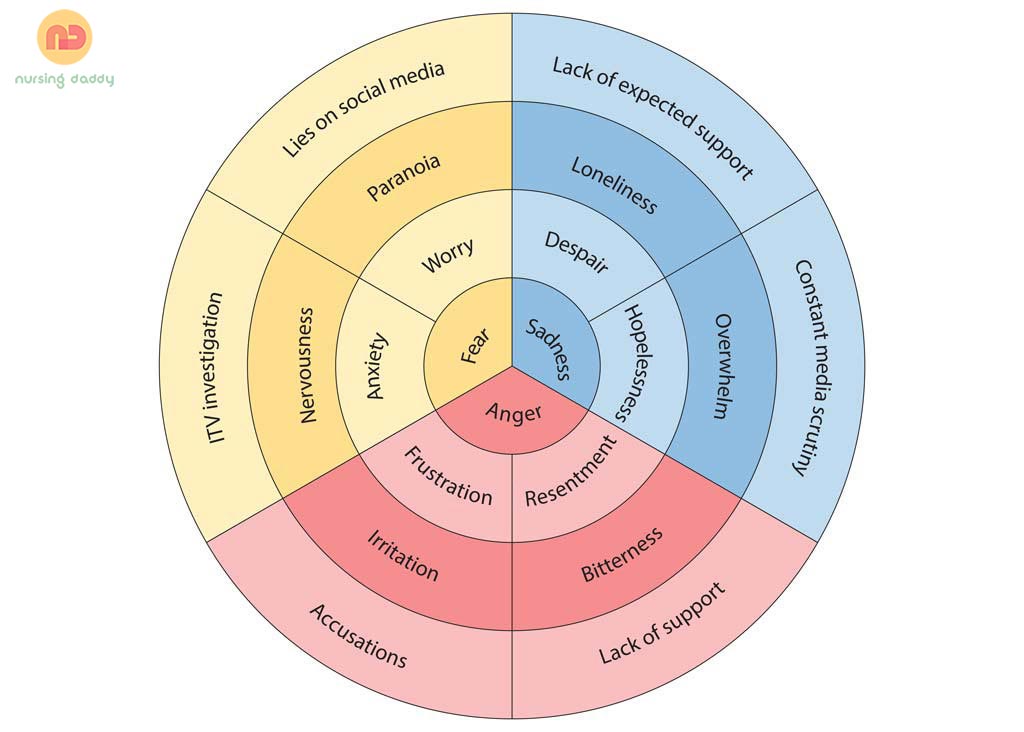
Interpreting Emotions in Philip Schofield’s Interview – An Emotional Wheel Analysis
The Emotional Wheel (see above diagram) is a powerful psychological tool to help individuals articulate and understand their emotions. A circular diagram organises emotions into groups based on their relational and hierarchical connections. At the centre of the wheel are basic, primary emotions. As you move outward, these emotions become more nuanced and specific.
In the Philip Schofield interview context, the Emotional Wheel roughly estimates the range of emotions expressed. This estimation is based on the thematic and sentiment analysis conducted on the interview text.
The wheel captures the primary emotions of sadness, fear, and anger at its core. Further, it explores these emotions into secondary and tertiary emotions, providing a more nuanced understanding of Schofield’s emotional state during the interview. It visually represents Schofield’s emotional journey, as expressed in his own words during the interview.
The diagram above is a simplified and estimated representation, and it’s important to remember that human emotions are complex and can overlap. The same word can mean different things in different contexts, and a single instance in the interview can evoke multiple emotions. I have tried as best as possible to provide the best account likely.
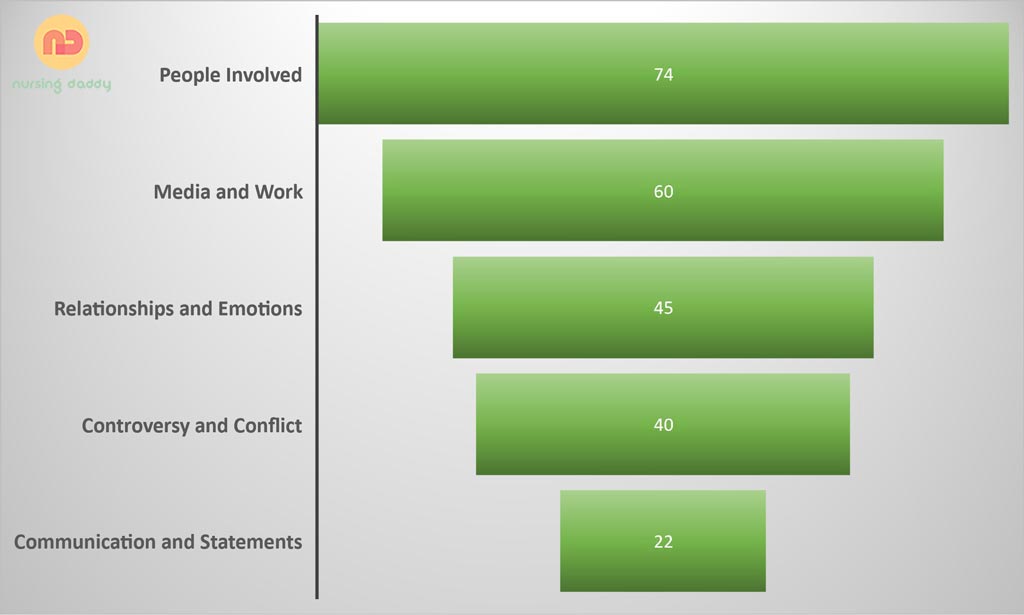
Thematic Analysis of Interview Content
Unlike the ‘Key Themes’ section, this ‘Thematic Analysis’ provides a more granular exploration of the interview’s corresponding sub-themes. The funnel chart above represents the thematic analysis of the interview content, highlighting the five most significant themes that emerged from the conversation.
People Involved: This theme encapsulates references to individuals or groups mentioned or involved in the interview. It includes words such as ‘man’, ‘young’, ‘person’, ‘friends’, ‘family’, ‘women’, ‘wife’, and ‘girls’.
Media and Work: This theme pertains to the media industry, specific media outlets or programs, and aspects of work. It comprises words like ‘ITV’, ‘morning’, ‘television’, ‘job’, ‘workplace’, ‘media’, ‘program’, ‘work’, ‘studios’, ‘news’, ‘newspaper’, ‘Twitter’, and ‘TV’.
Relationships and Emotions: This theme covers words related to interpersonal relationships and emotional states or feelings. It includes ‘relationship’, ‘feel’, ‘love’, ‘help’, ‘believe’, and ‘worry’.
Controversy and Conflict: This theme includes words that suggest controversy, conflict, or harmful actions and behaviours. Comments in this category include ‘sexual’, ‘wrong’, ‘power’, ‘lie’, ‘innocent’, ‘toxicity’, ‘untrue’, ‘lied’, ‘abuse’, ‘toxic’, ‘bullying’, ‘bully’, and ‘accusations’.
Communication and Statements: This theme relates to communication, dialogue, and formal statements or assertions. It includes ‘saying’, ‘question’, ‘statement’, and ‘questions’.
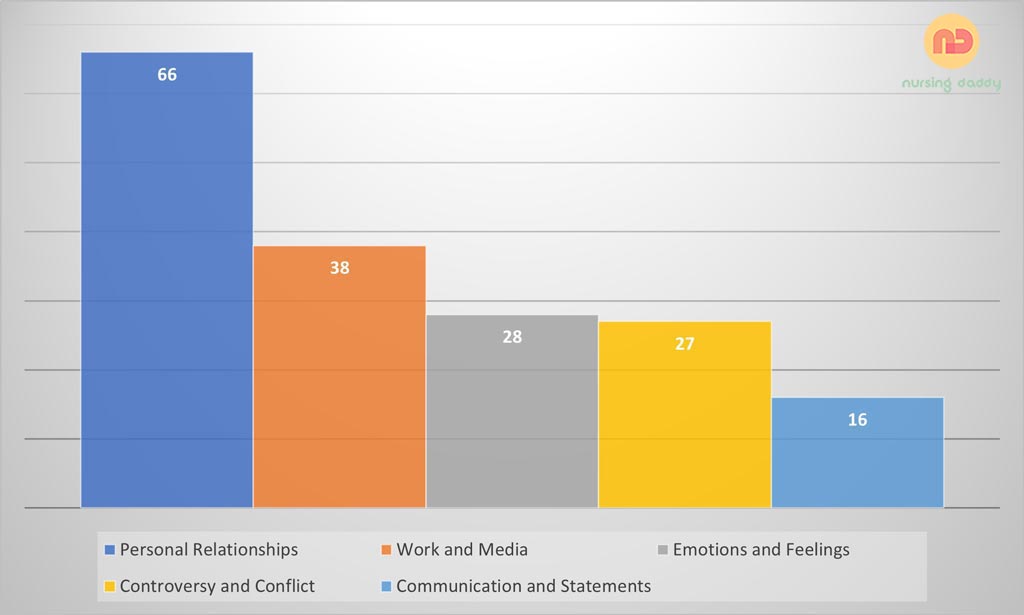
Understanding the Interview: Phrase Frequency Analysis
The column chart represents the frequency of different themes in the interview, as identified through a phrase frequency analysis. The phrases were grouped into five categories:
Personal Relationships: This category includes phrases that refer to interpersonal relationships, such as “young man”, “relationship with”, and “this young”. These phrases indicate discussions about personal connections and interactions.
Work and Media: This category includes phrases related to the interviewee’s work, the media industry, and specific media outlets or programs. Phrases like “this morning”, “of ITV”, and “work experience” fall into this category.
Emotions and Feelings: This category includes phrases that express emotional states or feelings. Examples include “you feel”, “God no”, and “my fault”.
Controversy and Conflict: This category includes phrases that suggest dispute, conflict, or harmful actions and behaviours. Phrases like “of sexual”, “something wrong”, and “sexual relationship” are part of this category.
Communication and Statements: This category includes phrases related to communication, dialogue, and formal statements or assertions. Phrases such as “on Twitter”, “your statement”, and “statement about” are included here.
Please note that these numbers represent each category’s total frequency of phrases.
Conclusion
The interview profoundly impacted me, evoking a complex mix of emotions. While I hesitate to label it anger, empathy initially overwhelmed me, eventually transforming into frustration. It baffles me how individuals cannot find solace in witnessing someone acknowledge their mistakes, allowing them to face the consequences in solitude. Why must the external world continuously fan the flames of an already raging fire, providing oxygen and combustible materials?
If anything can be gained, the interview provided a poignant narrative that underscored the complexities of personal relationships, professional conduct, and the toll of living a life under public scrutiny. Schofield’s relationship with a younger man in the workplace is a tale of personal indiscretion. It reflects individuals’ challenges navigating the blurred lines between secret desires and professional boundaries.
Schofield’s years of deception, while undoubtedly a personal failing, also highlight the pressures and fears associated with public life. His struggle to reconcile his personal life with his public persona led to a series of choices that have had profound implications for him and the young man involved and their respective families.
The impact on Schofield’s mental health is critical to this sad narrative. The constant vigilance of his daughters is a stark reminder of the personal cost of his actions. It shows the importance of mental health support and the need for open conversations about emotional well-being, particularly in high-pressure environments like the television industry.
The role of ITV in this saga must be considered. The network’s handling of the situation raises questions about the support systems in place for their employees. In their bid to maintain a public image, the well-being of individuals may have been compromised. This serves as a reminder for all organisations to prioritise the mental health of their employees, ensuring they have the necessary support during challenging times.
A learning point that can be taken from Schofield’s story is a stark reminder of the human cost of public life. The importance of honesty in personal relationships and the critical role of mental health support in the workplace. It’s a narrative that invites introspection, urging us to consider the impact of our actions on ourselves and those around us. But, behind the public persona, celebrities are human beings dealing with their struggles and challenges.
When one reaches the brink of their limits, the future becomes uncertain. Reflection becomes vital—should you pause to contemplate your situation? Or should you take further steps, hoping the next one will lead you to recovery? Alternatively, there may be a temptation to surrender and turn off the lights. However, I assure you that if you choose the latter, your capacity to endure further negativity is already at its peak, and additional burdens are unnecessary.
Postscript: ITV’s Duty of Care Under Scrutiny
In the wake of the revelations surrounding Philip Schofield’s departure from ITV, the network’s executives were called to account before the House of Commons Culture, Media and Sport Committee. This happened on Wednesday, 14 June 2003; I had already completed this post. I decided to add this postscript.
The questioning focused on ITV’s safeguarding and complaint-handling approach, particularly Schofield’s relationship with a younger colleague.
ITV chief executive Dame Carolyn McCall acknowledged the inappropriate power dynamics of the relationship but insisted that the network had not turned a blind eye to the rumours. She stated that ITV had repeatedly sought clarification from Schofield and the young man involved but received categorical denials each time.
The impact of the controversy on Schofield’s mental health has been significant, with the presenter suggesting that he had felt suicidal. ITV is now funding counselling for Schofield, demonstrating a belated recognition of the duty of care owed to their presenters.
However, focusing on Schofield’s welfare should not overshadow the young man’s experiences at the centre of the controversy. Dame Carolyn expressed concern for his welfare, acknowledging the intrusive media scrutiny he has faced. ITV is supporting him, even though he left the company in 2021.
This situation raises important questions about the balance of power in the media industry and the responsibility of networks to safeguard the welfare of all their employees. It is a stark reminder that the pursuit of public image should never come at the expense of individual well-being.
The story continues to unfold, with an external review underway to establish the facts about ITV’s handling of the affair rumours in 2020. As we await the findings of this review, it is clear that ITV has some serious work to do in rebuilding trust with its staff, viewers, and the wider public.
Sources
ITV, (2 June 2023). “Phillip Schofield: A timeline of the ITV saga so far, from the affair to his first public interviews”, ITV, [Accessed 3 June 2023]
John Bett, (2 Jun 2023). “Phillip Schofield’s daughters Molly May and Ruby – who ‘won’t let him out of their sight”. Mirror, [Accessed 3 June 2023]
Mattea Bubalo, (3 June 2023). “Phillip Schofield: Why is a top British morning TV show in crisis?”. BBC, [Accessed 29 May 2023]
Meghna Amin, (30 May 2023). “What could happen to This Morning as ITV is plunged into crisis following Phillip Schofield’s bombshell confession?”. [Accessed 29 May 2023]
Sam Hancock, (3 June 2023). “Phillip Schofield: ITV hasn’t learned from Caroline Flack’s death, her mother says”. BBC, [Accessed 29 May 2023]

